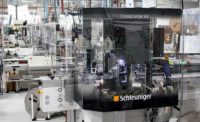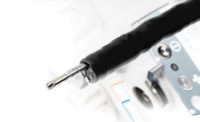Taylor Power Systems Inc. manufactures service generators for the oil and gas, agricultural and other industries. Located in Clinton, MS, Taylor Power’s headquarters and assembly plant includes more than 300,000 square feet of office, training and production space.
One of the company’s products is a diesel reefer generator set, also known as an underslung unit. This machine is designed to provide reliable, unattended continuous operation for refrigerated containers transported by trucks or trains. With the rapid growth in global trade, demand for the generator increased, and the company was struggling to keep up. The units must be produced with short lead times.
Taylor Power Systems turned to the Mississippi Manufacturers Association Manufacturing Extension Partnership (MMA-MEP) for help. An affiliate of the federal Hollings Manufacturing Extension Partnership (MEP), the MMA-MEP is a nonprofit organization that helps Mississippi manufacturers to be globally competitive.
A team from the MMA-MEP worked with Taylor’s engineers to create an assembly line based on lean principles with a target of doubling capacity. Cycle time data was used to create a line-balance chart, which was then used to redesign the assembly area. Additionally, workstation efficiency for assemblers was improved by adding a small inventory of parts in each station. Hour-by-hour production and quality boards were implemented to give feedback to management and workers.
The results were impressive: a 300 percent increase in peak output, a 52 percent decrease in work in process, a 50 percent improvement in quality, a 50 percent decrease in man-hours per unit, and a 43 percent decrease in floor space.
“Through the efforts of the MMA-MEP, our ability to increase production of generators for the intermodal market has more than doubled,” says Steve Duke, general manager of Taylor Power Systems. “Prior to this team working with us, we were attempting to increase production through methods that were not very lean, including adding to the length of our assembly line and building numerous additional production carts to build units.
“From the lean manufacturing principles that the MMA-MEP implemented, along with time studies, the length of our assembly line was reduced, and fewer units are on the line each day. Our units produced per day increased; our employees are happier; and some customers even requested that we cut back on our weekly shipping volume as we became more efficient.”
The MMA-MEP’s success with Taylor Power Systems is not unusual for MEP affiliates. The MEP is a public-private partnership dedicated to serving small and midsized manufacturers. With centers in all 50 states and Puerto Rico, MEP assisted 28,213 manufacturers in 2019, leading to $15.7 billion in sales, $1.5 billion in cost savings, $4.5 billion in new client investments, and creating or retaining 114,650 jobs.
MEP centers and partners have developed a wide range of services and initiatives to help manufacturers identify opportunities to accelerate and strengthen growth and competitiveness in the global marketplace. MEP centers work with manufacturers to develop new products, expand and diversify markets, improve processes, adopt new technology, conserve resources, and enhance value within supply chains. The program also serves as a bridge to other organizations and federal research labs.
As a public-private partnership, the program is delivering a high return on investment to taxpayers. For every dollar of federal investment, the MEP network generates $17.90 in new sales growth for manufacturers and $27 in new client investment. This translates into $2.3 billion in new sales annually. And, for every $1,501 of federal investment, the network creates or retains one manufacturing job.
Helping manufacturers get lean is a core competency for MEP affiliates. Here are a few of their stories. For more information on the MEP, visit www.nist.gov/mep.
Lean Trailer Assembly
Marine Venture Enterprises Inc. has been manufacturing boat trailers since 1989. Based in Baltimore, the company is well-known for quality and reliability. The family-owned and operated business employs some 25 people.
The company’s assembly plant can produce up to 40 boat trailers per day, depending on the production schedule and the size and complexity of each trailer. The shop-floor layout was based around production cells, with each trailer manufactured to completion in a single location. Although effective, the setup and process limited the number of trailers that could be produced in a given shift and day. It also created congestion for staging and placement of subassemblies and parts.
Marine Venture worked with the Maryland Manufacturing Extension Partnership (MDMEP) to evaluate the production process. After observing the assembly and subcomponent operations at the facility, MDMEP engineers presented several scenarios to Marine Venture’s leadership team.
The scenarios showed that Marine Venture could increase production capacity 20 to 100 percent. MDMEP helped the company redesign the production process so that parts and subassemblies were staged at each production station. The immediate impact was a 50 percent increase in production capacity on the line. The investment in more efficient processes led to higher sales, and Venture is adopting similar strategies in other areas of production.
“The MDMEP team provided great support, ideas and assistance to Venture in the redesign of our production process,” says Stephanie Van Slyke, vice president of Marine Venture. “Through these efforts, we were able to increase capacity, reduce production time, and support the growth of the company.”
Lean Opens Doors
Based in Little Rock, AR, National Custom Hollow Metal Doors (NCHMD) offers an extensive range of custom-made stainless steel and galvannealed metal doors and frames. Whether destined for heavy-duty industrial environments, hospitals and laboratories, restaurants or storefronts, the company’s doors are crafted to precise tolerances and exact specifications out of materials specifically chosen to ensure durability, appearance and ease of operation.
NCHMD had experience working with lean tools, and the company had achieved some positive results. As with many companies, however, the challenge was in sustaining continuous improvement, especially with personnel changes.
NCHMD contacted Arkansas Economic Development Commission Manufacturing Solutions (AEDC-MS), a MEP affiliate, for help developing a lean transformation strategy that would help the company meet sales demands and truly sustain continuous improvement.
AEDC-MS delivered value-stream mapping and training on Toyota kata, a structured way to create a culture of continuous learning and improvement at all levels. Kata is an organization’s daily habits or routines, forming its “muscle memory” for continuous learning and improvements.
Since the training, NCHMD increased sales by 10 percent; retained 5 percent of sales that would have been lost; added two workers and retained four others; and reaped more than $50,000 in cost savings.
“[The Arkansas MEP] has been a trusted partner to my company and whenever we are in need, it is the first organization we contact,” says Chris Mathews, owner of NCHMD.
Lean Furniture Making
Maine Woodworks creates cottage-style furniture that is bench-crafted and built to order in Saco, ME. The company uses regionally sourced, sustainably harvested hardwood; environmentally friendly finishes; and a combination of time-tested and modern day joinery.
The company is also a social enterprise of Creative Works, a 501(c)(3) nonprofit organization that supports individuals with disabilities. Maine Woodworks employs an integrated workforce made up of people with and without disabilities.
Matt Hickey, chief operating officer of Maine Woodworks wanted to redesign his facility to increase capacity and create room for production growth. He called Maine MEP for help.
Working with leadership from Creative Works and Maine Woodworks, experts from Maine MEP performed a thorough 5S review of the company’s facility, removing wastes and freeing some 30 percent of usable manufacturing space. The team also broke down the company's product offerings into families and developed ideal lean flows for each component of each family. The team then created optimum layouts using spaghetti diagrams to look at material and worker flow.
The new layout incorporated point-of-use storage and minimized product handling in a clean, organized work environment. Through this process, the Maine Woodworks team developed a better understanding of lean concepts and have since come up with many ideas to reduce waste and improve efficiencies.
“Thanks to Maine MEP, Maine Woodworks is prepared for significant growth in the future,” says Hickey. “We completed a total redesign of the production floor layout. The new layout has reduced waste, improved efficiencies, and lowered inventory levels. Production has increased by 6 percent, and first-pass yield has improved by more than 15 percent.”
Maine Woodworks is experiencing a record year, on pace for more than $1.3 million in sales. In addition, the company has made significant upgrades to its equipment and facilities. “Maine MEP was key in prioritizing those difficult decisions with a focus on increased production capacity and return on our investment,” says Hickey.
Maine Woodworks has empowered its employees through training. “MEP has been instrumental in helping us create a lean culture,” says Hickey.


















